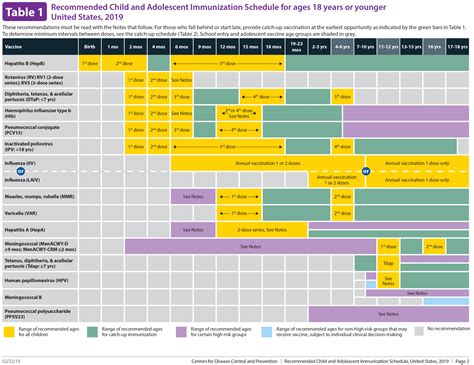CDC Recommended Vaccinations

Introduction to CDC Recommended Vaccinations
The Centers for Disease Control and Prevention (CDC) plays a crucial role in protecting public health and safety in the United States. One of the key strategies the CDC employs to prevent the spread of infectious diseases is through the recommendation of vaccinations. Vaccinations are a proven and effective way to prevent serious diseases and complications, and the CDC provides guidance on which vaccinations are necessary for different age groups and populations. In this article, we will explore the CDC recommended vaccinations, their importance, and the role they play in maintaining public health.
Why Vaccinations are Important
Vaccinations are important because they help prevent the spread of infectious diseases and protect individuals from serious health complications. By vaccinating against certain diseases, individuals can reduce their risk of infection and prevent the spread of disease to others. This is especially important for vulnerable populations, such as the elderly, young children, and people with weakened immune systems, who are more susceptible to serious complications from infectious diseases. Furthermore, vaccinations have been shown to be safe and effective in preventing the spread of disease, and they have played a crucial role in eradicating diseases such as smallpox and polio.
CDC Recommended Vaccinations for Children
The CDC recommends a series of vaccinations for children from birth to 18 years of age. These vaccinations are designed to protect against serious and potentially life-threatening diseases, such as measles, mumps, and whooping cough. The recommended vaccinations for children include: * Hepatitis B vaccine * Rotavirus vaccine * Diphtheria, tetanus, and pertussis (DTaP) vaccine * Haemophilus influenzae type b (Hib) vaccine * Inactivated poliovirus vaccine (IPV) * Measles, mumps, and rubella (MMR) vaccine * Varicella vaccine * Meningococcal conjugate vaccine * Human papillomavirus (HPV) vaccine
CDC Recommended Vaccinations for Adults
In addition to recommending vaccinations for children, the CDC also recommends vaccinations for adults. These vaccinations are designed to protect against diseases that can be serious and potentially life-threatening, such as influenza, pneumococcal disease, and shingles. The recommended vaccinations for adults include: * Influenza vaccine * Tdap vaccine * Pneumococcal conjugate vaccine * Shingles vaccine * Human papillomavirus (HPV) vaccine * Meningococcal conjugate vaccine
Importance of Staying Up-to-Date on Vaccinations
It is essential to stay up-to-date on vaccinations to ensure protection against infectious diseases. The CDC recommends that individuals stay current on all recommended vaccinations, and that they consult with their healthcare provider to determine which vaccinations are necessary. Additionally, individuals should inform their healthcare provider of any allergies or medical conditions that may affect their ability to receive certain vaccinations.
💡 Note: It is essential to consult with a healthcare provider before receiving any vaccination, especially if you have any underlying medical conditions or allergies.
Vaccination Schedules
The CDC provides vaccination schedules for different age groups and populations. These schedules outline the recommended vaccinations and the timing of each vaccination. The vaccination schedules are designed to ensure that individuals receive the necessary vaccinations to protect against infectious diseases. The CDC recommends the following vaccination schedules:
| Age Group | Recommended Vaccinations |
|---|---|
| Birth to 18 years | Hepatitis B, Rotavirus, DTaP, Hib, IPV, MMR, Varicella, Meningococcal conjugate, HPV |
| 19-64 years | Influenza, Tdap, Pneumococcal conjugate, Shingles, HPV, Meningococcal conjugate |
| 65 years and older | Influenza, Pneumococcal conjugate, Shingles, Meningococcal conjugate |
In summary, the CDC recommended vaccinations play a crucial role in protecting public health and safety. By staying up-to-date on vaccinations, individuals can reduce their risk of infection and prevent the spread of disease to others. It is essential to consult with a healthcare provider to determine which vaccinations are necessary and to stay current on all recommended vaccinations.
What is the importance of vaccinations?
+
Vaccinations are important because they help prevent the spread of infectious diseases and protect individuals from serious health complications.
What vaccinations are recommended for children?
+
The CDC recommends a series of vaccinations for children from birth to 18 years of age, including Hepatitis B, Rotavirus, DTaP, Hib, IPV, MMR, Varicella, Meningococcal conjugate, and HPV.
What vaccinations are recommended for adults?
+
The CDC recommends vaccinations for adults, including Influenza, Tdap, Pneumococcal conjugate, Shingles, HPV, and Meningococcal conjugate.